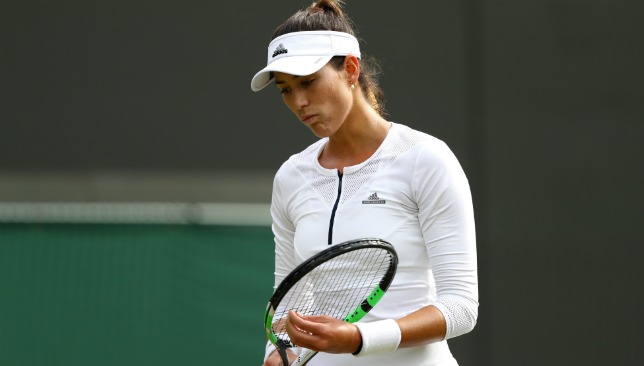
Following a shocking second round exit at the hands of world No124 Jana Cepelova, Garbine Muguruza left Wimbledon with lots to ponder, but also a better understanding of what it takes to be a top player and a grand slam champion.
Cepelova bounced Muguruza 6-3, 6-2 on Thursday, delivering the biggest upset of the tournament so far.
Muguruza, who won the French Open less than four weeks ago for her maiden grand slam triumph, and considering she had made the final last year at Wimbledon, the Spanish world No2 was looking to pick up where she left off at the All England Club.
But the trend of women’s first-time grand slam champions crashing out early in the following major continued, with Muguruza suffering a similar fate to the likes of Angelique Kerber, Sam Stosur and Petra Kvitova, who all slumped after their maiden slam success.
Asked how tough it was to recover following a grand slam victory and getting back to peak condition so fast, Muguruza said: “It is very difficult. I’m just experiencing a lot of things so fast. It’s my first time after doing a great result, coming to another grand slam.
“So I’m trying to discover how I’m going to feel, how do I have to go on court, how do I have to rest more. I think it’s great.
“Now I’m touching more a little bit all these great players, that they’re amazing, that they’re winning a lot of grand slams. But, hey, that’s what it takes, so I got to be ready…
“Hopefully my consistency will improve and I’ll be able to be deep in all the tournaments.”
122 ranking places between them, but it's Jana Cepelova who's left celebrating against Garbine Muguruza.#Wimbledon https://t.co/vA93lbMiNN
— Wimbledon (@Wimbledon) June 30, 2016
Muguruza blamed a lack of energy for her defeat to Cepelova – who has upset Serena Williams and Simona Halep in the past – and didn’t feel she was carrying too much pressure of expectation on her shoulders.
Kvitova, who captured her first of two grand slam titles at Wimbledon in 2011, crashed out of the first round of the US Open less than a couple of months later.
The Czech recalls how difficult it was to adapt to her new status as a major champion.
“Honestly for me it was very tough,” said Kvitova. “It took me a while, like a year maybe, to get somehow used to these things as the media attention, whatever it’s bringing with it.
“I was, I think, younger (than Muguruza), which was something new for me. I wasn’t really prepared for that. You can’t really prepare. It just came and you just have to deal with it. With the pressure on the court and off the court, it’s not really easy. You just feel that you should win everything when you win a grand slam but it’s not that easy. It took me a while…
“We will see how everything will go for her (Muguruza).”
Her doubles partner and compatriot Carla Suarez Navarro believes Muguruza’s defeat does not reflect a pattern of early major exits after a maiden slam triumph.
“I don’t think that was the case for Garbine, that because she won Roland Garros, she played bad like this, I don’t see it like this,” said Suarez Navarro, the No12 seed.
“Because I was talking to her in the locker room before her match and she was good, but then on the court she was like tired. I don’t think it was a really mental thing, only a physical thing.”
Muguruza takes with her several lessons learned from her Wimbledon experience, most importantly is better planning ahead of the majors.
“I think I will have to rest more, not keep practicing the same hard to prepare another grand slam because it’s very fast,” said the 22-year-old.
“I think I will have to take more careful those days where you have to rest. Even though you want to play, I don’t want to miss a day, but sometimes it’s better to rest because it’s going to make you play better. You don’t think, like, practicing 10 hours a day is going to make you play better after you don’t have energy…
“I’m going to learn that you really need to concentrate on how to recover, and don’t reach a moment where your energy is too low, especially to play a grand slam, and to face opponents that, hey, they’re good, they’re here, they want to beat you so much. You got to be ready. You cannot go out there not at your best.”
World No.124 Jana Cepelova produces the shock of The Championships, beating #RG16 champion Garbine Muguruza 6-3 6-2 pic.twitter.com/U3s9uVtOHf
— Wimbledon (@Wimbledon) June 30, 2016